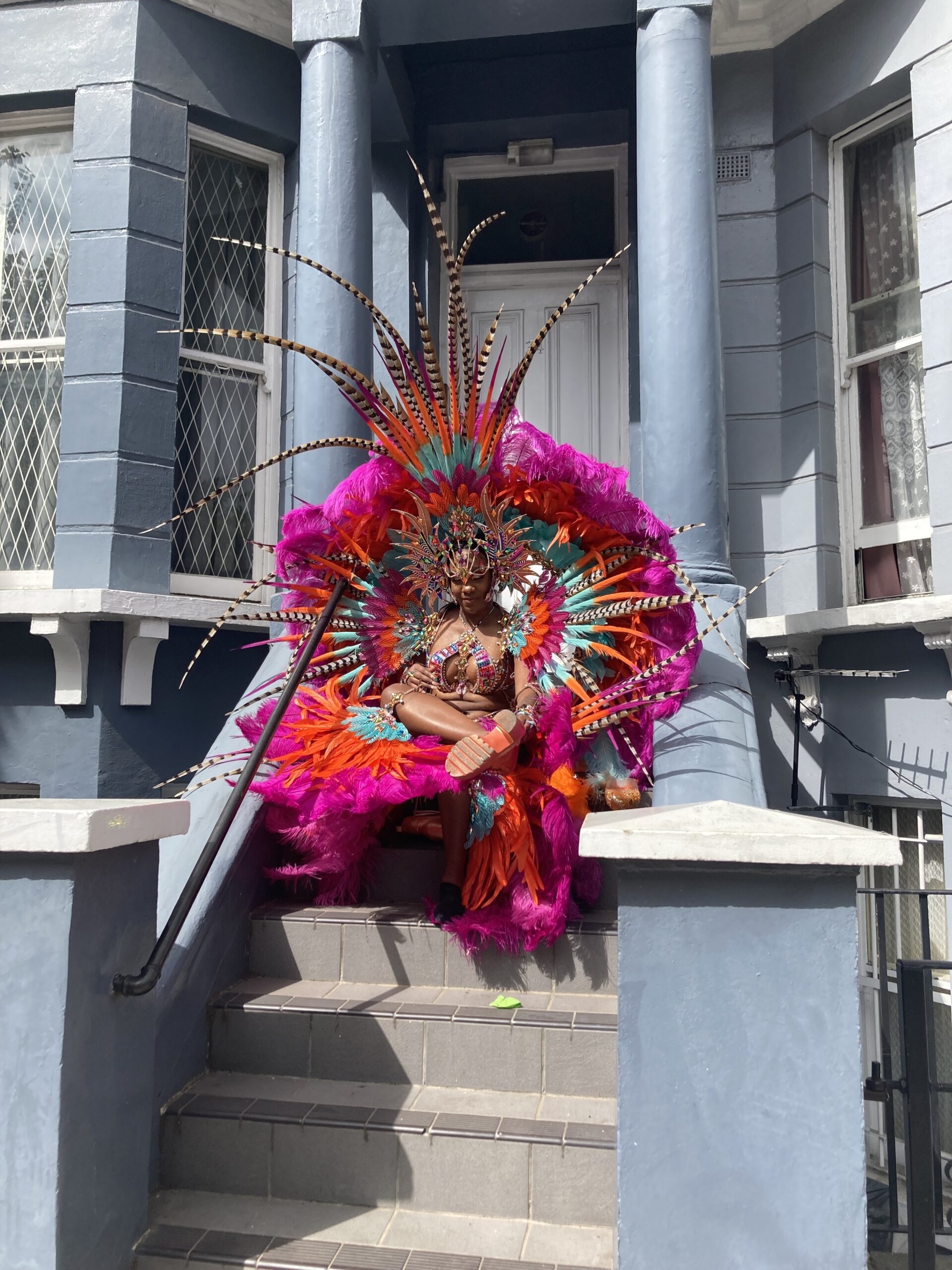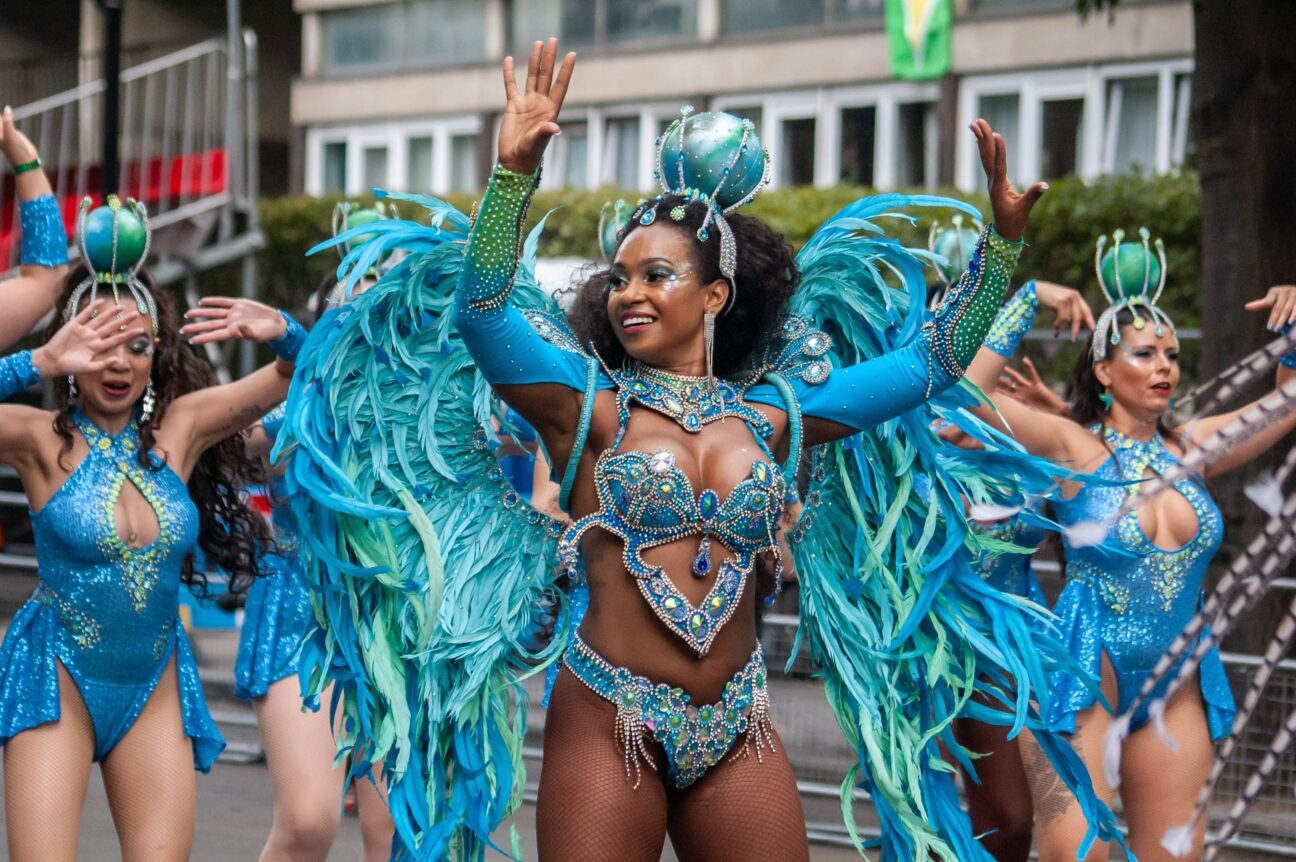What do you call it when a street transforms into a theater? That’s right, a carnival or masquerade. These words might seem like they belong to a distant era, but today, we can step outside and find ourselves in the midst of a modern carnival.
Theater on the Streets of the City: The Notting Hill Carnival in London

A mask, a costume, makeup — all of these allow a person to hide their true self and do things they normally wouldn’t, whether due to upbringing or social rules. Take a walk through Camden, for example — there, on the bridge over the canal, you’re sure to encounter massive punks, tattooed from head to toe, clad in studded jackets, with colorful mohawks on their heads. This costume broadcasts to passersby the role of this brutal person — enfant terrible — and what one might expect from them. They’re unlikely to recite John Donne to you, but they might very well behave like a hooligan.
Just like in the theater, when an actor steps on stage and does something that would definitely be condemned in everyday life. The theater is a place where playing the villain is socially acceptable behavior. Strange, isn’t it? Here’s Othello, grabbing his beloved wife by the throat, and we applaud him enthusiastically. Here’s Khlestakov lying to the Mayor, and we laugh heartily. Because we know — it’s a game, a performance, make-believe, no matter how real it might seem.
London’s main carnival takes place on the last weekend of summer — the Notting Hill Carnival, vibrant, unrestrained, crowded, overwhelming the orderly neighborhood so much that it even changes its scenery — residents have to cover the facades of their mansions with plywood sheets to protect them from the excessive exuberance of the revelers.
A carnival exists within boundaries much like a theater. A carnival is a theater that has spilled beyond the stage, turning anyone who steps onto its territory into an actor. Costumes, noise, chaos, music — what happens may seem completely uncontrollable, like a raging mountain stream. But in reality, a carnival operates according to its own laws, not strict but very recognizable.
One of Europe’s leading literary critics, Mikhail Bakhtin, came up with the fascinating term “carnivalization.” He applied this concept not only to François Rabelais’ novel Gargantua and Pantagruel but also to Dostoevsky’s novels. But what interests us now is one remarkable idea, fairly obvious, but it was Bakhtin who formulated and recorded it in his book Rabelais and His World. Look at this: “The carnival (we repeat, in the broadest sense of the word) liberated consciousness from the power of official worldview, allowed a new look at the world; without fear, without reverence, absolutely critically, but at the same time without nihilism, but positively, as it revealed the excessive material principle of the world, becoming and change, the inevitability and eternal triumph of the new, the immortality of the people.”
Through jokes, costumes, dance, and wild laughter, bright, real life broke free from the oppression of social norms, upbringing, and repression.
The Notting Hill Carnival appeared in London as a way to unite Caribbean immigrants and local residents. It served to reduce tension — a remarkable instance where the culture of laughter, the mask, Bakhtin’s carnivalization, flowed from scholarly books into real life. The carnival’s life began in 1966, with no more than a thousand dancers, drummers, and performers, all community residents. Today, the carnival is a multimillion-dollar two-day event, Rabelaisian in its essence. Among the stunningly beautiful dancers, resembling birds of paradise, you might find drug dealers, intoxicated individuals, hooligans, and foul-mouthed people. The respectable city hides in horror behind shields, distancing itself from these, as Bakhtin wrote, “manifestations of the lower bodily stratum”: “The folk culture of the past always, at all stages of its millennial development, strove to defeat with laughter, to sober up, to translate into the language of the material bodily lower all the key thoughts, images, and symbols of official cultures.”

Yes, that’s exactly what it looks like. Piles of trash, cigarette butts, broken bottles, foul smells, various traces of human activity — and feathers, glitter, bright and delicate makeup, mesmerising drumbeats, lush, gentle, perfect. All together — disgusting and beautiful, as befits a carnival.
The theatrical nature of the Notting Hill Carnival is all the more obvious the more its artificial nature becomes apparent. It is a descendant of J’ouvert, a traditional carnival celebration in many Caribbean countries, particularly in Trinidad. The real carnival in Trinidad in the 1780s was a lavish entertainment for colonisers — hunting, dinner parties, balls — in all of which the enslaved and indigenous people of Trinidad, as well as the Africans brought to the country, were, of course, forbidden to participate. The oppressed part of the population found a way out: they began holding their own tiny carnivals, springing up here and there — try to catch them. Using their own rituals and folklore, they played at the masquerades of their “masters,” mocking them, copying, and parodying them. It was a true theatrical comedy, low satire, an attempt to cope with inhumane conditions through this mockery, this trickster-like inversion.
A similar idea is secretly embedded in the Notting Hill Carnival. It is meant to mock boundaries, destroy them, and merge divided societies into one. Notting Hill transforms for two days into a haven for tricksters, whether comedians or demons, breaking laws, leaping out of strict moral boundaries, laughing out loud at this morality. The trickster has no direct malicious intent; with a theatrical gesture, he changes the essence and meaning, turning pompous seriousness into a game.
Of course, if you decide to go to the carnival as a spectator, you enter its space and become a participant (if not a co-conspirator). Just as in the theater, any object or person entering the stage space gains its voice and meaning, here, at the carnival, every spectator has their place in this anarchic, chaotic system. Your admiration or disgust, horror or delight, fear, rejection, or jubilation becomes part of the meaning of the London carnival, both beautiful and terrifying.





